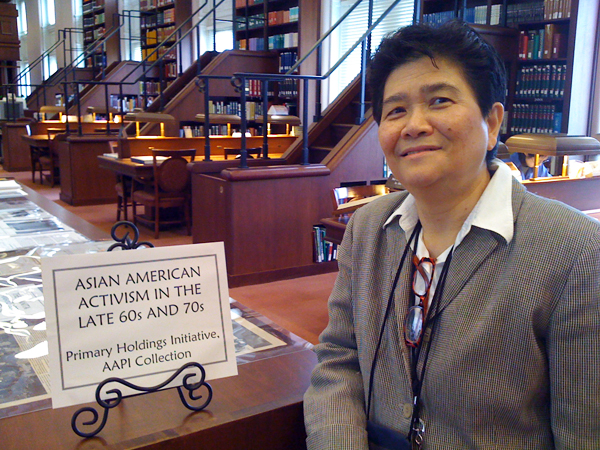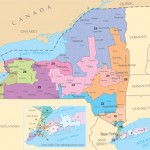
Remé Grefalda, founder and curator of the Asian-American Pacific Islander Collection in the Library of Congress. (Photo: Erwin de Leon)
Walking through the Library of Congress’ Asian Reading Room, librarian Remé Grefalda briskly pointed out the major collections. “These stacks contain books from our Chinese collection,” she dispassionately declared as she breezed to the next shelves. “Over there are volumes from our Japanese collection.” As we approached some displays in the middle of the room, her pace and tone shifted. “And these are some of our books and documents from the Asian-American Pacific Islander Collection,” she said, beaming with the pride of a parent.
The library’s Asian division recently introduced the Asian-American Pacific Islander Collection, its latest collection, and one which differs greatly from the other holdings. It’s a repository of the stories and histories of Asian immigrants and their descendants who have made America their home. It was born in large part through the passion and dedication of Grefalda, an immigrant herself.
Grefalda was born in Hong Kong to Filipino expatriates and spent part of her childhood in the United States. She settled permanently in this country in the 1970s, living first in New York and now in Washington, D.C. She is a published poet, playwright and author, founding editor of Our Own Voice: For Filipinos in the Diaspora, and the founder and sole curator of the Asian-American Pacific Islander Collection.
In 2006, Grefalda, then a volunteer at the library, put together a symposium on Carlos Bulosan, a twentieth century Filipino-American novelist and poet. The event was such a success, she says, that it spurred the formation of the Asian-American Pacific Islander Collection. It also led to Grefalda being hired as a librarian and curator.
The first sub-collection was named after Bulosan, the author of America Is in the Heart. Since then, Grefalda has established over two dozen Asian-American Pacific Islander collections including the archives of the leading authority on Chinese American History, Betty Lee Sung ; noted author and ceramicist Jade Snow Wong; the conceptual diaries of art director James Miho; and the files of U.S.-bound refugees from the Vietnamese Overseas Initiative for Conscience Empowerment.
“Remé is a hunter. She loves finding, taking care of, and promoting the materials,” said Gem Daus, adjunct faculty in the University of Maryland’s Asian American Studies Department. Indeed, Grefalda is constantly on the lookout for books, publications, documents and other ephemera that preserve the Asian immigrant experience. She expressed her concern that “if we don’t record Asian immigration and assimilation history, then we will lose it – the second and third generations will lose it.”
Grefalda understands how second generation immigrants – those born in the United States to foreign-born parents – might resist their own cultural heritage “because they feel they are more American.” But she believes this is not often the case with subsequent generations. Grefalda points to the hankering many Americans eventually feel for a sense of where they came from and who they are. “People are not interested in generic American,” she mused, saying people ask themselves, “What made you … you?” She warns that if children and grandchildren of immigrants do not educate themselves about their heritage and begin recording their own unique experiences as ethnic Americans, “then you are lost.”
Grefalda is also passionate about what she perceives as the need for immigrants and their descendants to begin telling, writing and documenting their stories through all media – books, articles, plays, videos, blogs, even tweets. “Absence of narratives about our reflections on our immediate and remote past have offered up zero history for our younger brothers and sisters,” she asserted, adding that immigrants need to “document our lives here if we are to pass on a legacy to our sons and daughters.”
She is very supportive of students sent by Daus, mostly second and third generation immigrants who research American History as experienced by Filipinos. This is the very generation Grefalda exhorts to write and record the immigrant American story. Grefalda promotes publishing and has even published some of the students’ papers.
The intrepid purveyor of immigrant history and legacy hopes that the Library of Congress’ Asian-American Pacific Collection will eventually have a specialist on the Asian immigrant experience. In spite of her role in birthing this new collection, she humbly protests that she is not that specialist – just someone who strongly believes that the stories of Asian immigrants and their children should be woven into the larger American narrative. In the meantime, she invites individuals and groups to consider donating their own archives and collections to the portfolio she nourishes. Knowing that the author of this profile is well connected in the LGBT community, she asked, “Know how I can get the papers of lesbian, gay, bisexual and transgender APA organizations?”
You can follow Erwin de Leon on Twitter at @ErwindeLeon.




